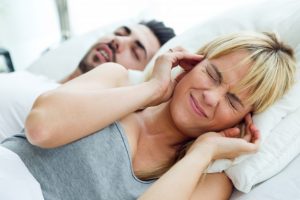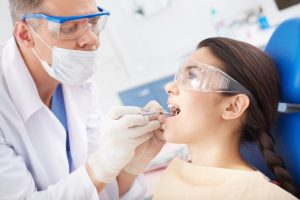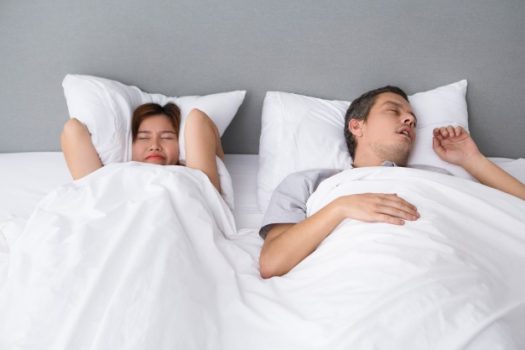What is sleep apnea?
Sleep apnea is a sleep disorder. People with this disorder experience pauses in breathing while they are asleep. These pauses in breathing can last for a few seconds or a few minutes. It can happen many times during the night. Loud snoring also accompanies it. People with sleep apnea cannot have a peaceful and deep sleep at night and usually get up feeling choked. Sleep apnea can even disturb the sleep of the person sleeping next to the patient.

What are the symptoms of sleep apnea?
- The patients with sleep apnea feel very sleepy during the day and are less alert while doing daytime activities.
- Due to disturbed sleep or inadequate sleep these patients are not fully rested, and they might become moody and irritable.
- They are less attentive and feel low on energy.
- They experience difficulty to learn and memorize things.
- People with sleep apnea are more prone to accidents while working and driving as they have difficulty in concentrating.
- If it is not treated, then it might lead to death due to inadequate oxygen in the body.
- It can lead to diseases like diabetes and liver failure.
- It can lead to depression.
- It can worsen the effect of ADHD.
- Children with sleep apnea may perform poorly in school activities.
- It can lead to high blood pressure.
- People with sleep apnea become more prone to strokes and heart problems.
Who are at risk of developing it?
- It affects more males than females.
- Obesity is one of the risk factors.
- People who have large necks are more prone to sleep apnea.
- Those who have large tonsils and large tongue are at more risk.
- It is common in people over forty years of age.
- Those who have obstructed nasal canal have more risk of developing sleep apnea.
- People suffering from GERD are more prone to sleep apnea.
- Sometimes it runs in the family.
What are its different types?
There are three types of sleep apnea. Obstructive sleep apnea, Central sleep apnea and a combination of both the conditions.
- Obstructive sleep apnea: It is the most common type of sleep apnea. The human airway is made up of collapsible tissues which relax when we sleep. Sometimes this airway blocks the passage of oxygen, leading to pausing of breath during sleep.
- Central sleep apnea: This type of sleep apnea happens due to the failure of the brain in sending signals to the tissues of the airway to breathe. The body does not make an effort to breath leading to the pausing of breath during sleep.
Sometimes sleep apnea occurs due to the combination of both the reasons.
How is it diagnosed?
Initially, the doctor asks specific questions to the patient about the quality of sleep he has at night. The doctor may question the partner of the patient if he or she has seen the patient go through the symptoms of snoring or getting up choked. The doctor may also recommend polysomnography which is a kind of sleep study.
How can we reduce the symptoms?
Dr. Deborah Tabb, a Bethesda dentist, suggests that losing weight can help in improving the symptoms of sleep apnea because overweight people have more tissues in their airway. She also suggests that the patients with sleep apnea should avoid smoking and drinking as it worsens the condition.

What are the different types of treatments offered?
If a person has moderate to severe sleep apnea and he has tried all the self-help techniques then the doctor may suggest the following treatments:
- Constant Positive Air Pressure: The constant positive air pressure machine is a mask-like device that creates a fixed air pressure to keep the air passages open. It covers the mouth and the nose and is worn by the patient before sleeping.
- Expiratory positive airway pressure: It is a smaller and more comfortable device compared to CPAP. It fits in the nostrils to keep the air passage open.
- Bilevel positive airway pressure: This is used for people suffering from central sleep apnea. This device is automatic, and it provides more pressure while inhaling and less pressure while exhaling.
- Adaptive servo-ventilation: This device stores information about breathing and uses automatic air pressure to help the patient.
- Dental devices: These devices are made of acrylic and fit inside the mouth like a mouth guard. Some devices fit on the chin and head to adjust the position of the jaw. Some devices act as tongue retainers. These devices open air passages for proper breathing by keeping the tongue and jaw forward.
People with sleep apnea should always seek medical help because deep comfortable sleep at night is essential to enjoy a healthy life.
References:
- https://en.m.wikipedia.org/wiki/Sleep_apnea
- http://bethesdafamilydentistry.com/sleep-apnea/
- https://www.webmd.com/sleep-disorders/sleep-apnea/sleep-apnea

